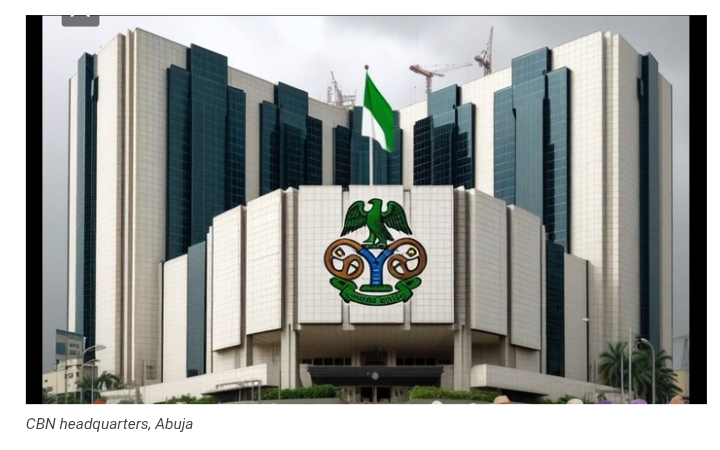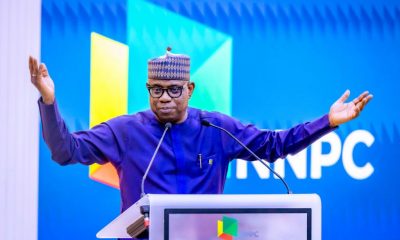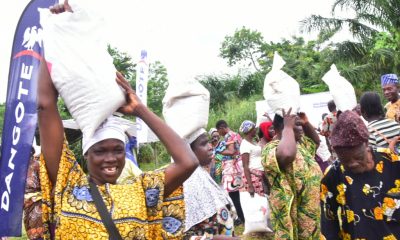Feature/OPED
PIA: Pollution and Host Communities

By Jerome-Maeario Utomi
Like every new invention which comes with opportunities and challenges, the passage by the National Assembly and signing into law of the Petroleum Industry Bill about two years ago by the President Muhammadu Buhari-led federal government, after about 17 years of protracted back-and-forth debates, was greeted with mixed feelings. While some hailed the development, others welcomed it with scepticism.
Aside from the belief that the coming of PIA will make innovation possible within the petroleum sector, those who expressed happiness about the coming of the Act predicated their joys on the fact that the provisions, as sighted in PIA, will assist straddle the middle ground in the nation’s petroleum sector which has for a very long time manifested, proved to be a sector with neither primed nor positioned potentials.
Supporting this assertion is the graphic description by PIA advocates of how the new Act will locate, harmonize and strategically engineer prosperity among the operators of the up, mid and downstream sectors of the oil industry while turning the host communities into a zone of peace and democratized development via the 3% allocation to the host communities as captured in Chapter 3 of the Act.
In the opinion of this piece, this joy expressed by stakeholders for reasons qualifies as apposite, especially when one commits to mind the fact that for decades, the operational templates of the players within the industry, particularly the International Oil Companies (IOCs), have for decades been reputed for non-compliance to set rules and devoid of international best practices.
In fact, industry watchers have, at different times, and places argued that before the advent of PIA, the sector was confronted by the following weaknesses; the existence of multiple but obsolete regulatory frameworks which characterize the oil and gas exploration and production in Nigeria.
Secondly, the federal government failed to get the nations’ refineries back to full refining capacity. Thirdly, the Petroleum Ministry’s inability to get committed to making IOCs adhere strictly to the international best practices as it relates to their operational environment.
Fourth and final is the non-existence of clear responsibility/work details and action plans for government agencies and parastatals functioning, monitoring/regulating the sector.
The above failures have, as a direct consequence; cast a long dark shadow on both the ministry and the sector.
To further explain these points beginning with the first challenge, it is worth noting that the business of crude oil exploration and issues of oil production in the country is regulated by multiple but very weak laws and Acts- of which most of these laws are not only complicate enforcement but curiously too old-fashioned for the changing demands of time. Thereby, creating loopholes for operators, especially the IOCs, to exploit both the government and host communities.
Some of these laws/Acts in question operated for over five decades without achieving purposes, and they include but are not limited to; the Petroleum Act of 1969, The Harmful Waste (Special Criminal Positions etc), Act 1988, Mineral Oil Safety Regulation 1963, Petroleum (Drilling and Production) Regulation 1969 (Subsidiary Legislation to The Petroleum Act), The off-shore Oil Revenue (Registration of Grants)Act 1971, Oil in Navigable Act 1968, Petroleum Production and Distribution (Anti Sabotage) Act 1975, Associated Gas Re-injection Act 1979, Associated Gas Re-injection (continued Flaring of Gas) Regulation, Associated Gas Re-injection (Amendment) Decree 1985, Oil Pipeline Act Chapter (CAP) 338, Laws of the Federation of Nigeria (L.F.N.) 1990, and Gas Flare prohibition and punishment) Act 2016 among others.
Even as the above remains lamentable, facts have since emerged that instead of providing the anticipated legal, governance, regulatory and fiscal framework for the Nigerian petroleum industry and the host communities, the Petroleum Industry Act (Act), like the other failed laws that it came to replace, has contrary to expectation become different things to different peoples.
To many, PIA is not only an evil wind that blows nobody any good but a toothless bulldog that neither bites nor barks. To others, it is but is a palliative that cures the effect of sickness while leaving the root cause to thrive.
To the host and impacted communities, the Act has become a first line of conflict between crude oil prospecting, exploration companies and their host communities. It is a law that has come to steal, kill and destroy. Members of this group have come to a sudden realization that nothing has changed.
Without going into specifics, concepts, provisions and definitions, there is also greater evidence that points to the fact that the underlying premise behind PIA enactment has been defeated, the eliciting reason for concern that what is currently happening between oil companies and their host communities may no longer be the first half of a reoccurring circle, but, rather the beginning of something negatively new and different.
Take, as an illustration, if PIA is fundamentally effective and efficient, why is it not providing a strong source of remedy for individuals and communities negatively affected by oil exploration and production in the coastal communities? If these frameworks exist and have been comprehensive as a legal solution to the issues of oil-related violations, why are the IOCs operating in the country indulging in selective implementation of the Act?
Why is the Act not enforced by the federal government and other relevant agencies? Why are these hosts and impacted communities still suffering at the hands of the crude oil exploration and production companies operating in the Niger Delta region?
While answers to the above questions are expected, this piece, however, believes that there are reasons why these issues raised about PIA failures and failings cannot be described as unfounded.
The facts are there and speak for it.
On 28th of March 2023, the people of Kantu/Odidi, host communities to Odidi Flow station, OML 42 in Gbaramatu kingdom, Warri South West Local Government Area of Delta State, staged a peaceful protest against the non-implementation of PIA.
While calling for holistic repair works on the Trans Forcados Pipeline (TFP), which runs through OML 42 in Warri South West LGA to Forcados Terminal in Burutu LGA of Delta State, the protesting communities gave the operators a 7-day ultimatum to commence genuine implementation of the PIA process and payment of the 3% of 2022 operating expenses as stipulated by the PIA with immediate effect to enable the communities to resume implementation of developmental projects in the communities, warning that failure to do so may lead to the shutdown of operational activities in the OML 42 Asset.
Lamenting that the TFP pipeline was constructed in the early 1960s and has outlived its lifespan long ago, leading to continuous pollution of the environment and destruction of the ecosystem, creating hardship for the locals, the communities stressed that TFP is one of the major pipelines destroying the environment because it has expired and cannot withstand the pressure of crude oil transported through it.
They, therefore, demanded full replacement of the said pipeline instead of the sectional repair works being planned by NEPL/NECONDE without recourse to its negative implications on communities and the environment, particularly since sectional repair works will not stop further leakages.
Kantu/Odidi protest occurred at a time when the dust raised by the 14 days ultimatum/threat issued to another oil company by the oil-rich community of Tsekelewu (Polobubo) in Warri North Local Government Area of Delta State was yet to settle.
In that particular ‘event’, the people of Tsekelewu (Polobubo) also threatened to shut down ongoing exploration activities of Conoil Producing Limited if the company failed to reach a definite agreement with the community on the implementation of Chapter 3 of the Petroleum Industry Act (PIA) for the Tsekelewu bloc of communities, supports this assertion.
The Host Community lamented that they adopted the option due to the seemingly snobbish attitude of the management of Conoil Producing, as the company’s management had refused to honour letters asking for a meeting with the TCDA on the issue of the PIA implementation.
Away from the persistent highhandedness of the IOCs, this piece is also of the position that PIA is as weak, defective and insufficient as the laws/Acts it was enacted to replace when it comes to pollution prevention, monitoring and control within the sector.
In fact, it will not be characterized as an overstatement to say that it shares the same body and spirit with the now rested Harmful Waste (Special Criminal Positions etc), Act 1988. The major defect with the referenced Act was signposted in its definition of harmful substance based solely on its impact on human beings and does not include its impacts on the environment and animals.
It focused only on the commission of any action or omission by persons without lawful authority. Thus, where an organization has a license to store waste resulting from production, they are seemingly omitted from the ambit of the Act, but the law failed to take into consideration the inadequate storage or inadequate waste management system by licensed firms or groups. Such failure or oversight is glaring and inherent in PIA.
Adding context to the colossal damage harmful substances arising from crude oil production have caused the nation, the National Oil Spill Detection and Response Agency NOSDRA reports show that oil spill incidents occurred 921 times in 2015, resulting in a loss of 47,714 barrels of oil, the highest within the period under review. In 2016, 688 cases of oil spills occurred, culminating in a volume of 42,744 barrels of oil. In 2017 and 2018, 596 and 706 cases of oil spills occurred and resulted in the spillage of 34,887 and 27,985 barrels of oil, respectively. Oil spills occurred on 732 occasions, spewing 41,381 barrels of oil in 2019, and 455 cases were recorded in 2020 with 23,526 barrels of oil. In 2021, companies reported 388 incidents, resulting in 23,956 barrels of oil.
The report also observed that oil spills should be closed off within 24 hours. And oil companies are required to fund the clean-up of each spill and pay compensation to local communities affected if the incident was the company’s fault.
Despite these beautiful provisions, there exists no appreciable instance within the period under review where such obligations to host communities have been obeyed. This piece also holds the opinion that under the PIA regime, no operator can claim a clean hand when it comes to obeying such laws in Nigeria, and the regulatory agencies have never bothered to hold them accountable for such failures.
Still on inefficiency and insufficiency of PIA provisions to effectively control pollution arising from crude oil exploration and production, this author, in a similar intervention, after a visit to the Niger Delta region, stated that a tour by boat of creeks and coastal communities of Warri South West and Warri North Local Government Areas of Delta state would amply reveal that the much-anticipated end in sight of gas flaring is actually not in sight. In the same manner, a journey by road from Warri via Eku-Abraka to Agbor, and another road trip from Warri through Ughelli down to Ogwuashi Ukwu in Aniocha Local Government of the state, shows an environment where people cannot properly breathe as it is littered by gas flaring points.
To a large extent, the above confirms as true the recently published report, which among other concerns, noted that Nigeria has about 139 gas flare locations spread across the Niger Delta both in onshore and offshore oil fields where gas which constitutes about 11 per cent of the total gas produced are flared.
Apart from the health implication of flared gases on humanity, their adverse impact on the nation’s economy is equally weighty. For instance, a parallel report published a while ago underlined that about 888 million standard cubic feet of gas were flared daily in 2017. The flared gas, it added, was sufficient to light up Africa, or sub-Saharan Africa, generate 2.5 gigawatts (Gw) of power or produce 50 million barrels of oil equivalent (boe) or produce 600,000 metric tonnes of liquefied petroleum gas (LPG) per year, produce 22 million tonnes of carbon dioxide (CO2), feed two-three liquefied natural gas (LNG) trains, generate 300,000 jobs, able to attract $3.5 billion investment into Nigeria and has $350 million carbon credit value’. This is an illustrative pointer as to why the nation economically gropes and stumbles.
Banking on what experts are saying, the major reason for the flaring of gases is that when crude oil is extracted from onshore and offshore oil wells, it brings with it raw natural gas to the surface and where natural gas transportation, pipelines, and infrastructure are lacking, like in the case of Nigeria, this gas is instead burned off or flared as a waste product as this is the cheapest option.
It, therefore, remains an ugly narrative that the choice to flare gas in the country is largely predicated on economies. This has been going on since the 1950s when crude oil was first discovered in commercial quantities in Nigeria.
While Nigeria and Nigerians persist in encountering gas flaring in the country, even so, has, successive administrations in the country made both feeble and deformed attempts to get it arrested.
In 2016, before the advent of PIA, President Muhammadu Buhari led administration enacted Gas Flare Prohibition and Punishment), an act that, among other things, made provisions to prohibit gas flaring in any oil and gas production operation, blocks, fields, onshore or offshore, and gas facility treatment plants in Nigeria.
On Monday, September 2, 2018, Dr Ibe Kachikwu, Minister of State for Petroleum (as he then was), while speaking at the Buyers’ Forum/stakeholders’ Engagement organized by the Gas Aggregation Company of Nigeria in Abuja, among other things, remarked thus; ‘I have said to the Department of Petroleum Resources, beginning from next year (2019 emphasis added), we are going to get quite frantic about this (ending gas flaring in Nigeria) and companies that cannot meet with extended periods –the issue is not how much you can pay in terms of fines for gas flaring, the issue is that you would not produce. We need to begin to look at the foreclosing of licenses’. That threat has since ended in the frames, as there has been little or nothing to get the threat actualized.
The administration also launched the now abandoned National Gas Flare Commercialization Programme (NGFCP), a programme, according to the federal government, aimed at achieving the flares-out agenda/zero routine gas flaring in Nigeria by 2020. Again, like a regular trademark, it failed.
Away from Buhari’s administration, in 1979, the then federal government, in a similar style, came up with the Associated Gas Re-injection Act, which summarily prohibited gas flaring and also fixed the flare-out deadline for January 1, 1984. It failed in line with the leadership philosophy in the country.
Similar feeble and deformed attempts were made in 2003, 2006, and 2008. In the same style and span, precisely on July 2, 2009, the Nigerian Senate passed a Gas Flaring (Prohibition and Punishment) Bill 2009 (SB 126) into law, fixing the flare-out deadline for December 31, 2010- a date that slowly but inevitably failed.
Not stopping at this point, the FG made another attempt in this direction by coming up with the Petroleum Industry Bill, which fixed the flare-out deadline for 2012. The same Petroleum Industry Bill (PIB) got protracted till 2021 when it completed its gestation and was subsequently signed into law by President Buhari as Petroleum Industry Act (PIA).
To win, the nation must borrow a ‘soul in order to raise a body’. They must seek solutions from the countries that are presently doing well in these areas where we are facing challenges. Part of that effort will require going beyond PIA to recognise the region as a special area for purposes of development. This demand cannot be described as unfounded as it is historically based, logical and factually supported.
Recall that the colonial government, long before independence turned down the demand for a Calabar/Ogoja/Rivers (COR) region/state. But identified the Niger Delta as a troubled spot and recommended to the then Federal Government that the region be regarded as a special area for purposes of development.
Without any shadow of a doubt, I hold an opinion that the federal government’s inability to treat the region as such set the stage for and nourished the restiveness in both the region and the sector.
Most importantly, the people of the region must be directly involved in the management of their resources.
Jerome-Mario is the programme coordinator (Media and Public Policy) at the Social and Economic Justice Advocacy (SEJA). He can be reached via Je*********@***oo.com/08032725374.
Feature/OPED
Love, Culture, and the New Era of Televised Weddings

Weddings have always held a special place in African culture. They are more than ceremonies; they are declarations of love, family, identity, and tradition. From the vibrant colours of aso-ebi to the rhythmic sounds of live bands and the emotional exchange of vows, weddings represent a moment of cultural heritage.
In recent years, weddings have gone beyond physical venues. What was once an exclusive gathering for family and friends has transformed into a shared experience for wider audiences. Social media first opened the door, allowing guests and admirers to witness love stories in real time through Instagram posts, TikTok highlights, and YouTube recaps.
And now, television platforms are taking this even further, giving weddings a new kind of permanence and reach.
High-profile weddings, like the widely celebrated union of Adeyemi Idowu, popularly known as Yhemolee (Olowo Eko) and his wife Oyindamola, fondly known as ThayourB, captured massive public attention. Moments from their wedding became a live shared experience on television (GOtv & DStv).
From the high fashion statements to the emotional highlights, viewers were able to feel part of something bigger, a reminder that weddings inspire not just both families but entire communities.
This shift reflects a broader reality: weddings today are content. They inspire conversations about fashion, relationships, lifestyle, and aspiration. They preserve memories in ways previous generations could only imagine. For Gen Z couples, their wedding is no longer just a day; it becomes a story that can be revisited, celebrated, and even inspire others planning their own journey to forever.
Broadcast platforms like GOtv are playing a meaningful role in this transformation. By bringing wedding-related content directly into homes, GOtv is helping audiences experience these moments not just through social media snippets but in real time.
One of the most notable offerings is Channel 105, The Wedding Channel, Africa’s first 24-hour wedding channel, available on GOtv. The channel is fully dedicated to African weddings, lifestyle, and bridal fashion, showcasing everything from dream ceremonies to the realities of married life. Programs like Wedding Police and Wedding on a Budget, and shows like 5 Years Later, offer a deeper look into marriage itself, reminding viewers that weddings are just the beginning of a lifelong journey.
GOtv is preserving culture, celebrating love, and inspiring future couples with this channel. It allows viewers to witness traditions from different regions, discover new ideas, and feel connected to moments that might otherwise remain private.
With platforms like GOtv, stories continue to live on screens across Africa, where love, culture, and celebration can be experienced by all.
To upgrade, subscribe, or reconnect, download the MyGOtv App or dial *288#. For catch-up and on-the-go viewing, download the GOtv Stream App and enjoy your favourite shows anytime, anywhere.
Feature/OPED
Brent’s Jump Collides with CBN Easing, Exposes Policy-lag Arbitrage

Nigeria is entering a timing-sensitive macro set-up as the oil complex reprices disruption risk and the US dollar firms. Brent moved violently this week, settling at $77.74 on 02 March, up 6.68% on the day, after trading as high as $82.37 before settling around $78.07 on 3 March. For Nigeria, the immediate hook is the overlap with domestic policy: the Central Bank of Nigeria (CBN) has just cut its Monetary Policy Rate (MPR) by 50 basis points to 26.50%, whilst headline inflation is still 15.10% year on year in January.
“Investors often talk about Nigeria as an oil story, but the market response is frequently a timing story,” said David Barrett, Chief Executive Officer, EBC Financial Group (UK) Ltd. “When the pass-through clock runs ahead of the policy clock, inflation risk, and United States Dollar (USD) demand can show up before any oil benefit is felt in day-to-day liquidity.”
Policy and Pricing Regime Shift: One Shock, Different Clocks
EBC Financial Group (“EBC”) frames Nigeria’s current set-up as “policy-lag arbitrage”: the same external energy shock can hit domestic costs, FX liquidity, and monetary transmission on different timelines. A risk premium that begins in crude can quickly show up in delivered costs through freight and insurance, and EBC notes that downstream pressure has been visible in refined markets, with jet fuel and diesel cash premiums hitting multi-year highs.
Market Impact: Oil Support is Conditional, Pass-through is Not
EBC points out that higher crude is not automatically supportive of the naira in the short run because “oil buffer” depends on how quickly external receipts translate into market-clearing USD liquidity. Recent price action illustrates the sensitivity: the naira was quoted at 1,344 per dollar on the official market on 19 February, compared with 1,357 a week earlier, whilst street trading was cited around 1,385.
At the same time, Nigeria’s inflation channel can move quickly even during disinflation: headline inflation eased to 15.10% in January from 15.15% in December, and food inflation slowed to 8.89% from 10.84%, but energy-led transport and logistics costs can reintroduce pressure if the risk premium persists. EBC also points to a broader Nigeria-specific reality: the economy grew 4.07% year on year in 4Q25, with the oil sector expanding 6.79% and non-oil 3.99%, whilst average daily oil production slipped to 1.58 million bpd from 1.64 million bpd in 3Q25. That mix supports external-balance potential, but it also underscores why the domestic liquidity benefit can arrive with a lag.
Nigeria’s Buffer Looks Stronger, but It Does Not Eliminate Sequencing Risk
EBC sees that near-term external resilience is improving. The CBN Governor said gross external reserves rose to USD 50.45 billion as of 16 February 2026, equivalent to 9.68 months of import cover for goods and services. Even so, EBC views the market’s focus as pragmatic: in a risk-off tape, investors tend to price the order of transmission, not the eventual balance-of-payments benefit.
In the near term, EBC expects attention to rotate to scheduled energy and policy signposts that can confirm whether the current repricing is a short, violent adjustment or a more durable regime shift, including the U.S. Energy Information Administration (EIA) Short-Term Energy Outlook (10 March 2026), OPEC’s Monthly Oil Market Report (11 March 2026), and the U.S. Federal Reserve meeting (17 to 18 March 2026). On the domestic calendar, the CBN’s published schedule points to the next Monetary Policy Committee meeting on 19 to 20 May 2026.
Risk Frame: The Market Prices the Lag, Not the Headline
EBC cautions that outcomes are asymmetric. A rapid de-escalation could compress the crude risk premium quickly, but once freight, insurance, and hedging behaviour adjust, second-round effects can linger through inflation uncertainty and a more persistent USD bid.
“Oil can act as a shock absorber for Nigeria, but only when the liquidity channel is working,” Barrett added. “If USD conditions tighten first and domestic pass-through accelerates, the market prices the lag, not the headline oil price.”
Brent remains an anchor instrument for tracking this timing risk because it links energy-led inflation expectations, USD liquidity, and emerging-market risk appetite in one market. EBC Commodities offering provides access to Brent Crude Spot (XBRUSD) via its trading platform for following energy-driven macro volatility through a single instrument.
Feature/OPED
Gen Alpha: Africa’s Digital Architects, Not Your Target Audience

By Emma Kendrick Cox
This year, the eldest Gen Alpha turns 16.
That means they aren’t just the future of our work anymore. They are officially calling for a seat at the table, and they’ve brought their own chairs. And if you’re still calling this generation born between 2010 and 2025 the iPad generation, then I hate to break it to you, but you’re already obsolete. To the uninitiated, they look like a screen-addicted mystery. To those of us paying attention, they are the most sophisticated, commercially potent, and culturally fluent architects Africa has ever seen.
Why? Because Alphas were not born alongside the internet. They were born inside it. And by 2030, Africa will be home to one in every three Gen Alphas on the planet.
QWERTY the Dinosaur
We are witnessing the rise of a generation that writes via Siri and speech-to-text before they can even hold a pencil. With 63% of these kids navigating smartphones by age five, they don’t see a QWERTY keyboard as a tool. They see it as a speed bump, the long route, an inefficient use of their bandwidth. They don’t need to learn how to use tech because they were born with the ability to command their entire environment with a voice note or a swipe.
They are platform agnostic by instinct. They don’t see boundaries between devices. They’ll migrate from an Android phone to a Smart TV to an iPhone without breaking their stride. To them, the hardware is invisible…it’s the experience that matters.
They recognise brand identities long before they know the alphabet. I share a home with a peak Gen Alpha, age six and a half (don’t I dare forget that half). When she hears the ding-ding-ding-ding-ding of South Africa’s largest bank, Capitec’s POS machine, she calls it out instantly: “Mum! Someone just paid with Capitec!” It suddenly gives a whole new meaning to the theory of brand recall, in a case like this, extending it into a mental map of the financial world drawn long before Grade 2.
And it ultimately lands on this: This generation doesn’t want to just view your brand from behind a glass screen. They want to touch it, hear it, inhabit it, and remix it. If they can’t live inside your world, you’re literally just static.
The Uno Reverse card
Unlike any generation we’ve seen to date, households from Lagos to Joburg and beyond now see Alphas hold the ultimate Uno Reverse card on purchasing power. With 80% of parents admitting their kids dictate what the family buys, these Alphas are the unofficial CTOs and Procurement Officers of the home:
-
The hardware veto: Parents pay the bill, but Alphas pick the ISP based on Roblox latency and YouTube 4K buffers.
-
The Urban/Rural bridge: In the cities, they’re barking orders at Alexa. In rural areas, they are the ones translating tech for their families and narrowing the digital divide from the inside out.
-
The death of passive: I’ll fall on my sword when I say that with this generation, the word consumer is dead. It implies they just sit there and take what you give them, when, on the contrary, it is the total opposite. Alphas are Architectural. They are not going to buy your product unless they can co-author the experience from end to end.
As this generation creeps closer and closer to our bullseye, the team here at Irvine Partners has stopped looking at Gen Alpha as a demographic and started seeing them as the new infrastructure of the African market. They are mega-precise, fast, and surgically informed.
Believe me when I say they’ve already moved into your industry and started knocking down the walls. The only question is: are you building something they actually want to live in, or are you just a FaceTime call they are about to decline?
Pay attention. Big moves are coming. The architects are here.
Emma Kendrick Cox is an Executive Creative Director at Irvine Partners
-

 Feature/OPED6 years ago
Feature/OPED6 years agoDavos was Different this year
-
Travel/Tourism10 years ago
Lagos Seals Western Lodge Hotel In Ikorodu
-

 Showbiz3 years ago
Showbiz3 years agoEstranged Lover Releases Videos of Empress Njamah Bathing
-

 Banking8 years ago
Banking8 years agoSort Codes of GTBank Branches in Nigeria
-

 Economy3 years ago
Economy3 years agoSubsidy Removal: CNG at N130 Per Litre Cheaper Than Petrol—IPMAN
-

 Banking3 years ago
Banking3 years agoSort Codes of UBA Branches in Nigeria
-

 Banking3 years ago
Banking3 years agoFirst Bank Announces Planned Downtime
-

 Sports3 years ago
Sports3 years agoHighest Paid Nigerian Footballer – How Much Do Nigerian Footballers Earn
























